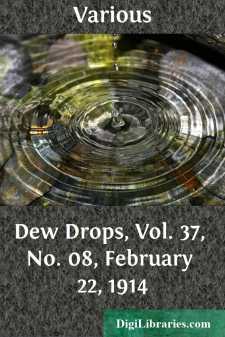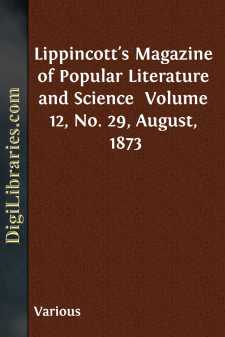Categories
- Antiques & Collectibles 13
- Architecture 36
- Art 48
- Bibles 22
- Biography & Autobiography 813
- Body, Mind & Spirit 142
- Business & Economics 28
- Children's Books 17
- Children's Fiction 14
- Computers 4
- Cooking 94
- Crafts & Hobbies 4
- Drama 346
- Education 46
- Family & Relationships 57
- Fiction 11829
- Games 19
- Gardening 17
- Health & Fitness 34
- History 1377
- House & Home 1
- Humor 147
- Juvenile Fiction 1873
- Juvenile Nonfiction 202
- Language Arts & Disciplines 88
- Law 16
- Literary Collections 686
- Literary Criticism 179
- Mathematics 13
- Medical 41
- Music 40
- Nature 179
- Non-Classifiable 1768
- Performing Arts 7
- Periodicals 1453
- Philosophy 64
- Photography 2
- Poetry 896
- Political Science 203
- Psychology 42
- Reference 154
- Religion 513
- Science 126
- Self-Help 84
- Social Science 81
- Sports & Recreation 34
- Study Aids 3
- Technology & Engineering 59
- Transportation 23
- Travel 463
- True Crime 29
Sort by:
by:
Various
VOL. 37. NO. 8 WEEKLY.DAVID C. COOK PUBLISHING CO., ELGIN, ILLINOIS.GEORGE E. COOK. EDITOR.FEBRUARY 22, 1914. "We're all such little girls, Miss Lee. We can't do things for people. They have to do things for us, all the time, don't you see? How can we do much helping?" Little Grace Mayne looked into her teacher's face with earnest eyes as she said this. The girls in the class...
more...
by:
Various
THE NEW HYPERION. FROM PARIS TO MARLY BY WAY OF THE RHINE. THE FLOWERS OF WAR."Thou art no less a man because thou wearest no hauberk nor mail sark, and goest not on horseback after foolish adventures." So I said, reassuring myself, thirty years ago, when, as Paul Flemming the Blond, I was meditating the courageous change of cutting off my soap-locks, burning my edition of Bulwer and giving my...
more...
by:
Various
OUT FOR ANOTHER HOLIDAY. (By our Impartial and Not-to-be-biassed Critic.) I had been told that Ostend was an excellent place. "Quite a Town of Palaces!" was the enthusiastic description that had reached me. So I determined to leave "Delicious Dover" (as the holiday Leader-writer in the daily papers would call it), and take boat for the Belgian coast. The sea was as calm as a lake, and...
more...
by:
Various
ARTICLE I Some Results of the Artificial Propagation of Maine and California Salmon in New England and Canada, Recorded in the Years 1879 and 1880 Bulletin of the United States Fish Commission, Vol. 1, Page 270, 1881 New Bedford, Mass May 20, 1879. Prof. S. F. Baird: Sir: I have just been in the fish market and a crew were bringing in their fish from one of the "traps." A noticeable and...
more...
by:
Various
American Missionary Association. The Rooms of the American Missionary Association are now in the Bible House, New York City. Correspondents will please address us accordingly. Visitors will find our Rooms on the sixth floor of the Bible House, corner Ninth Street and Fourth Avenue; entrance by elevator on Ninth Street. DR. STORRS, ON THE NEGRO PROBLEM. Not long since Rev. R.S. Storrs, D.D., preached a...
more...
by:
Various
APPARATUS FOR MANUFACTURING GASEOUS OR AERATED BEVERAGES. The apparatus employed at present for making gaseous beverages are divided into two classes—intermittent apparatus based on chemical compression, and continuous ones based on mechanical compression. The first are simple in appearance and occupy small space, but their use is attended with too great inconveniences and losses to allow them to be...
more...
by:
Various
enji Monogatari, the original of this translation, is one of the standard works of Japanese literature. It has been regarded for centuries as a national treasure. The title of the work is by no means unknown to those Europeans who take an interest in Japanese matters, for it is mentioned or alluded to in almost every European work relating to our country. It was written by a lady, who, from her...
more...
by:
Various
"Hello, Foster, what's that you're doing?—shooting with a bow and arrows?" "Yes, Stuart made 'em for me. Come in and try 'em." Harry came into the yard, where Foster was shooting at a collar box placed on a grassy bank, and made a few unsuccessful shots at twenty yards, when Foster took the bow, and hit the box frequently, to Harry's wonder and envy....
more...
by:
Various
No description available
by:
Various
THE FAR AWAY COUNTRY NORA HOPPER CHESSON Far away's the country where I desire to go, Far away's the country where the blue roses grow, Far away's the country and very far away, And who would travel thither must go 'twixt night and day. Far away's the country, and the seas are wild That you must voyage over, grown man or chrisom child, O'er leagues of land and water a...
more...











